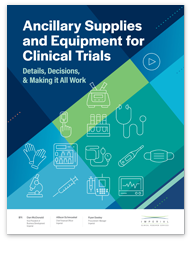Our free ebook, “Ancillary Supplies and Equipment for Clinical Trials: Details, Decisions, and Making it All Work,” is available now. Download your free copy here.
Our ebook is a valuable resource for clinical trial sponsors. It provides in-depth insights and practical strategies for identifying and securing the appropriate ancillary supplies and equipment to support data integrity, protect participant safety, and improve overall efficiency.
Here’s a look at what you will learn from the ebook:
Getting the Right Items: It’s Not Easy
The growing complexity of ancillary supplies and equipment for clinical trials underscores the need for meticulous planning and specificity when sourcing materials. With global regulations, logistics constraints, and evolving technology shaping supply decisions, assuming that any device or material will suffice is a costly mistake. Sponsors and CROs must approach procurement with a targeted strategy, which includes:
- Compatibility
- Regulatory hurdles
- Availability
This will help ensure clinical trials run smoothly and meet rigorous standards.
The Supply Chain: It’s Still Tough
Clinical trial success hinges on meticulous planning, and nowhere is this more evident than in supply chain management. Every element—from procurement to distribution—must align perfectly with study protocols, regulatory requirements, and site-specific logistics.
Overlooking even a single detail, such as compatibility testing or location-specific import restrictions, can threaten the reliability of study results. The key takeaway? Start early, plan thoroughly, and partner with the right vendors to navigate the complexities of global clinical trials effectively.
Sourcing Your Items: There Are Strategies Involved
In clinical trial logistics, proactive sourcing and planning are paramount. Delays in procurement, regulatory hurdles, and supply disruptions can derail timelines and impair data quality.
A successful strategy involves:
- Early ordering
- Diversification of supply sources
- Collaboration with regional suppliers to navigate international restrictions
Sponsors who anticipate potential pitfalls and maintain open communication with vendors are best positioned to ensure the timely, efficient delivery of critical supplies and equipment.
Managing Lot and Expiry: Issues Can Arise
Effective lot tracking and expiry management aren’t just for medications—they are crucial for medical ancillary devices and disposables in clinical trials. Failing to track expiration dates, recalls, and preventive maintenance can lead to compliance issues and even jeopardize patient safety.
By implementing strategies such as First Expiry/First Out (FEFO), real-time inventory monitoring, and supplier collaboration, organizations can reduce waste, avoid critical shortages, and maintain regulatory compliance—all essential for ensuring trials run smoothly and safely.
Make the Right Choice: Rent or Purchase?
Renting or buying ancillary supplies and equipment for clinical trials is a strategic decision that impacts cost efficiency and trial flexibility. While renting offers convenience, maintenance coverage, and streamlined logistics, purchasing provides long-term value, customization, and geographic flexibility. The key is to balance cost, duration, and regulatory considerations—ensuring the chosen approach aligns with clinical study needs while optimizing resources and compliance.
Recalls and Safety Notices: Keep Up to Speed
Managing recalls and safety notices is a critical compliance task in clinical trials, ensuring patient safety and regulatory adherence. Overlooking these alerts can have severe consequences, underscoring the need to establish a structured recall strategy. Companies must proactively document their retrieval procedures, conduct annual mock recall drills, and promptly and effectively track and respond to recalls. Staying prepared minimizes disruptions and safeguards patients.
Working With Ancillary Supplies and Equipment Vendors
Selecting the right ancillary supplies and clinical study equipment vendor is about more than just availability—it’s about expertise, resilience, and logistical precision. Sponsors and CROs must be assured that their vendor:
- Understands clinical needs
- Maintains agile supply chains
- Provides accessible inventory tracking
- Ensures compliance with expiration management
Asking the right questions upfront helps prevent costly disruptions, safeguards study integrity, and ensures seamless clinical study execution.
Final Thoughts: Empowering Your Clinical Trial

As you navigate your own clinical trial, we invite you to explore important insights shared in our ebook, “Ancillary Supplies and Equipment for Clinical Trials: Details, Decisions, and Making it All Work.” It’s designed to inform and inspire action, encouraging sponsors and CROs to implement learned strategies in their operations. This guide is your companion on the journey toward clinical trial success.
Simply download your free copy here.

